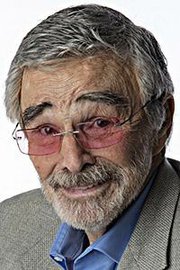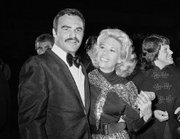Burt Reynolds, the handsome film and television star known for his acclaimed performances in Deliverance and Boogie Nights, commercial hits such as Smokey and the Bandit and for an active off-screen love life which included relationships with Loni Anderson and Sally Field, has died at age 82.
His death was confirmed Thursday by his agent Todd Eisner. In a statement, his niece, Nancy Lee Hess, called his death "totally unexpected," although she acknowledged he had health issues.
The mustachioed, smirking Reynolds inspired a wide range of responses over his long, erratic career: critical acclaim and critical scorn, popular success and box office bombs. Reynolds made scores of movies, ranging from lightweight fare such as the hits The Cannonball Run and Smokey and the Bandit to more serious films like The Longest Yard and The Man Who Loved Cat Dancing.
He received some of the film world's highest and lowest honors. He was nominated for an Oscar for Boogie Nights, the Paul Thomas Anderson film about the pornography industry; won an Emmy for the TV series Evening Shade, and was praised for his starring role in Deliverance.
One of his movies, White Lightning, released in 1973, about a moonshine runner out to avenge the death of his younger brother, was filmed in Arkansas. In the television series Evening Shade, Reynolds also won a Golden Globe in 1992 for playing Wood Newton, a former professional football player who returns to his Arkansas hometown to coach the high school team.
But Reynolds also was a frequent nominee for the Razzie, the tongue-in-cheek award for Hollywood's worst performance. And, his personal life provided ongoing drama, particularly after an acrimonious divorce from Anderson in 1995. He had a troubled marriage to Judy Carne, a romance with Dinah Shore and a relationship with Field damaged by his acknowledged jealousy of her success.
Through it all he presented a genial persona, often the first to make fun of his own conflicted image.
"My career is not like a regular chart, mine looks like a heart attack," he told The Associated Press in 2001. "I've done over 100 films, and I'm the only actor who has been canned by all three networks. I epitomize longevity."
Reynolds was candid about his flops, his regrets and about his many famous friends. He would call posing nude for Cosmopolitan one of his biggest mistakes because it undermined the respect he had gained for Deliverance.
Born in Lansing, Mich., and raised in Florida, he was an all-Southern Conference running back at Florida State University in the 1950s. Reynolds appeared headed to the NFL until injuries from an automobile accident ended his chances. He dropped out of college and drifted to New York, where he worked as a dockhand, dance-hall bouncer, bodyguard and dish washer before returning to Florida in 1957 to enroll in acting classes.
Moving to Hollywood, he found work as a stuntman. As a star, he often performed his own stunts, and he played a stuntman in the 1978 film Hooper, one of his better reviewed films.
In the 1960s he made dozens of appearances on such TV shows as Bonanza, The Twilight Zone and Perry Mason. His first film role came in 1961's Angel Baby, and he followed it with roles in other mediocre movies, the kind, he liked to joke, that were shown in airplanes and prisons.
In the film adaptation of James Dickey's novel Deliverance, Reynolds starred as Lewis Medlock, the intrepid leader of an ill-fated whitewater canoe trip.
Deliverance was an Oscar nominee for best picture and no film made him prouder. In his 2015 memoir But Enough About Me, he wrote that Deliverance would be his choice if he could put one of his movies in a time capsule.
"It proved I could act," he wrote.
But soon after filming was completed, he made a decision he never stopped regretting. While appearing on The Tonight Show with Cosmopolitan editor Helen Gurley Brown, he accepted her invitation to be the first male centerfold for her magazine.
The April 1972 issue of Cosmopolitan quickly sold more than 1 million copies, but turned his life into a "carnival." And, Reynolds' performance in Deliverance was snubbed by the movie academy.
He remained an A-list movie star, starring in such films as Shamus, The Best Little Whorehouse in Texas and three popular Smokey and the Bandit comedies, with co-stars including Field and Jackie Gleason.
Reynolds also directed a few of the films he starred in, including Gator, Sharky's Machine and Stick, and made cameo appearances in other films.
Reynolds rebounded with the role of porn movie impresario Jack Horner in Paul Thomas Anderson's Boogie Nights, which brought him some of his best reviews even though he felt ambivalent about his character.
He won a Golden Globe for best supporting actor and received an Oscar nomination. Convinced he would win, he was devastated when the Oscar went to Robin Williams for Good Will Hunting.
"I once said that I'd rather have a Heisman Trophy than an Oscar," he wrote in his memoir. "I lied."
Reynolds devoted much of his later years to his only son, Quinton, whom he had adopted with Anderson.
Reynolds returned to Florida in 1969, buying property in Jupiter. There he opened the Burt Reynolds Jupiter Theatre and a Burt Reynolds and Friends Museum, where he displayed his memorabilia and sometimes lectured to drama students.
Information for this article was contributed by Hillel Italie and the late Bob Thomas of The Associated Press.
A Section on 09/07/2018

